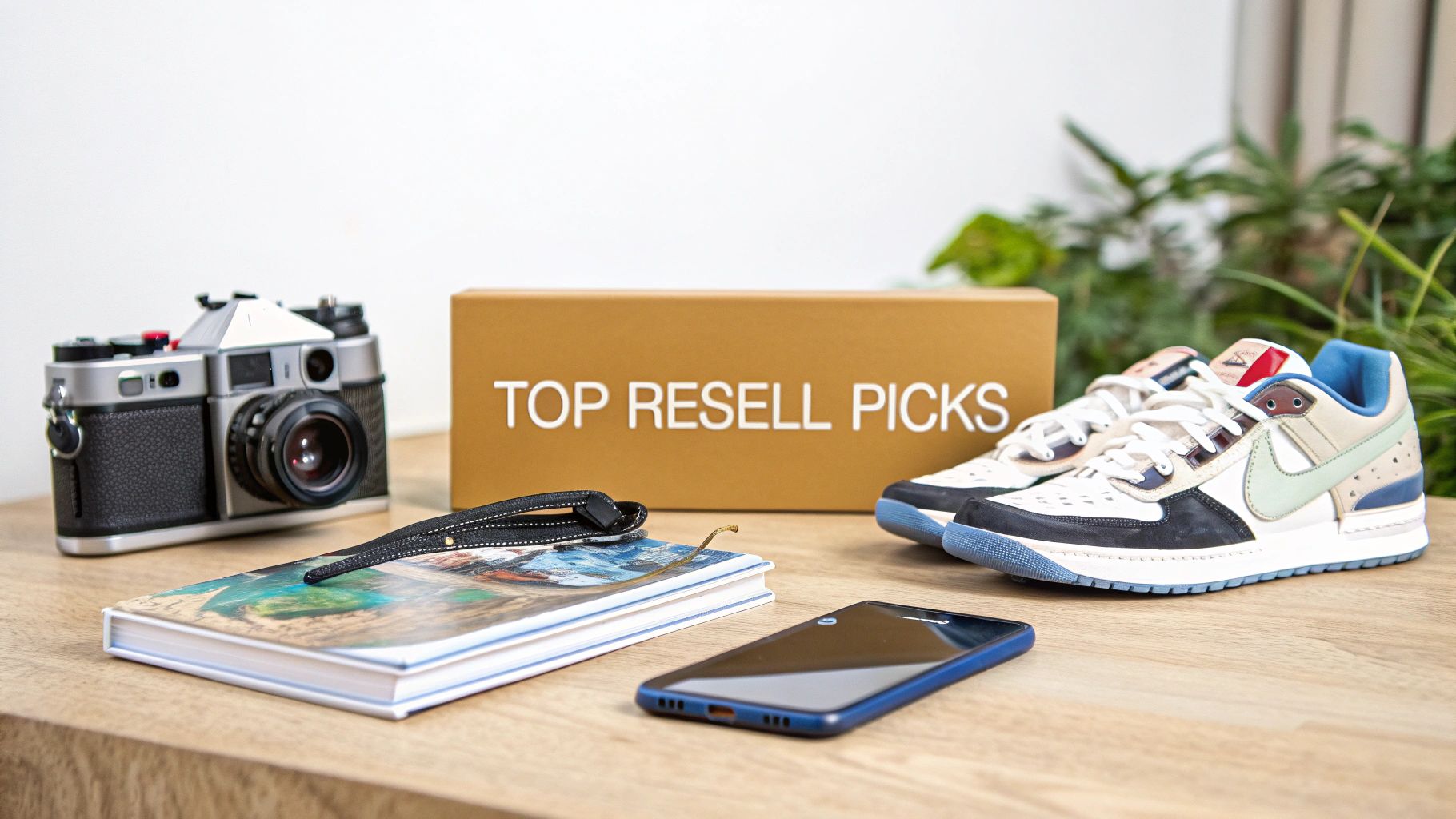Starting a reselling business can feel like a modern-day treasure hunt, but the real prize isn't just finding items, it's finding the right items. The difference between a hobby and a profitable venture often comes down to knowing which products consistently deliver high margins. While many people chase the same obvious trends, savvy resellers are looking deeper, exploring overlooked niches and using powerful tools to gain an edge.
This guide moves beyond generic advice to give you a curated list of the most profitable items to resell, focusing on a mix of vintage treasures and everyday goods that hold surprising value. We'll break down not just what to sell, but how to source it, price it effectively, and turn your keen eye into a consistent income stream. Whether you're a weekend thrifter or a seasoned professional, these insights will help you identify the opportunities others miss. To dive deeper into specific products that consistently perform well, refer to our guide on the Most Profitable Items to Sell on Amazon.
Our focus here is on building a more resilient, profitable resale business in 2025. Let's explore the categories that are currently generating the biggest returns and learn the strategies to make them work for you.
1. Curio
For anyone serious about finding the most profitable items to resell, knowledge isn't just power; it's profit. Curio transforms your smartphone into an antique and collectible expert, leveraging powerful AI to instantly identify items you find in the wild. This tool is a game-changer for resellers, turning uncertain thrift store finds and dusty estate sale discoveries into confident, well-informed inventory decisions.
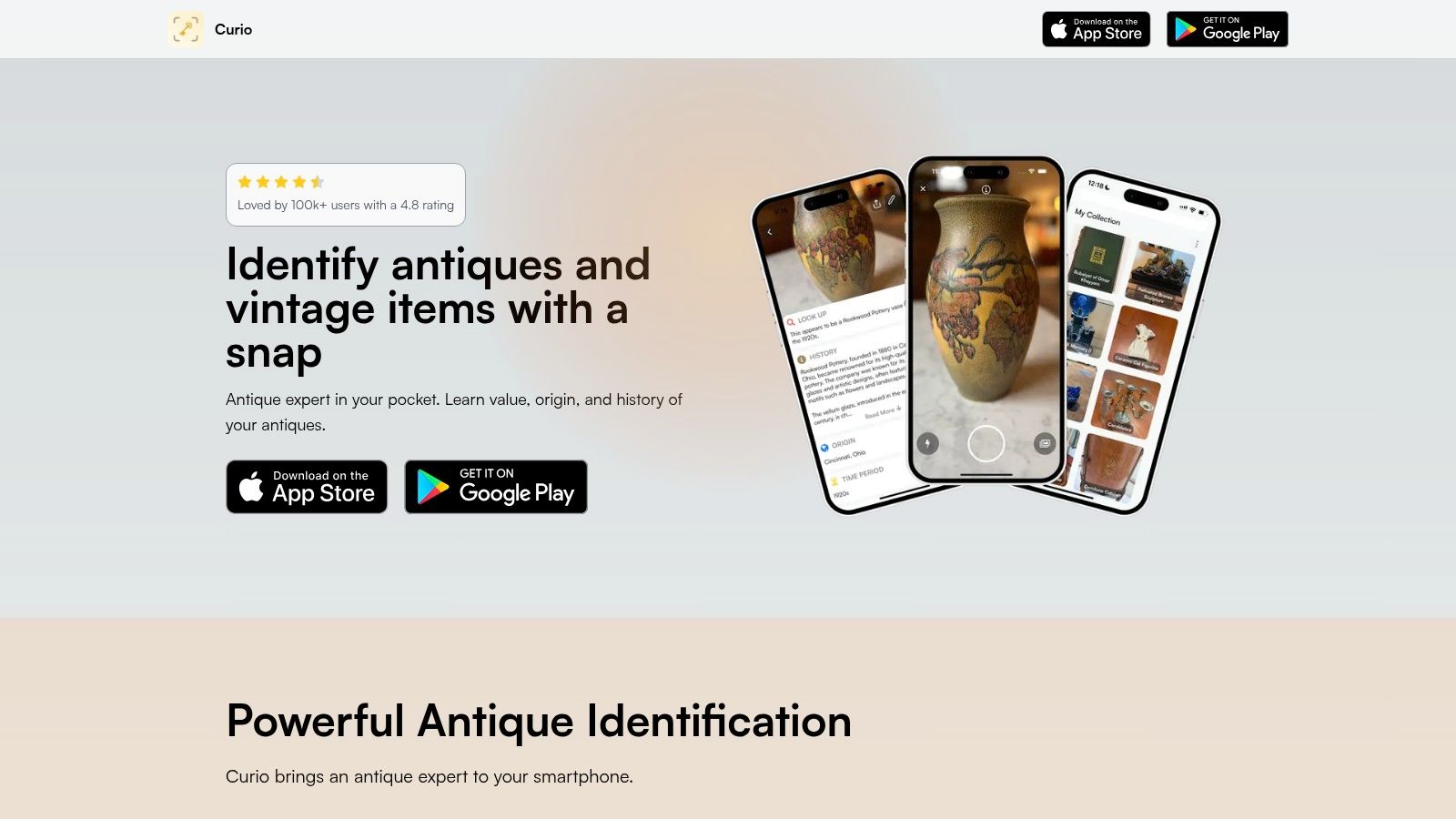
Curio excels by providing immediate, actionable intelligence. Simply snap a photo of an item, and the app delivers a concise identification, its historical context, origin, and estimated time period. This storytelling element is invaluable for creating compelling product listings that attract buyers. More importantly for resellers, Curio provides a realistic market appraisal and visual links to comparable items currently for sale online, removing the guesswork from pricing.
Why It Stands Out
What sets Curio apart from a simple Google Lens search is its specialized focus and comprehensive feature set designed for collectors and sellers. The platform is trusted by over 100,000 users and maintains a stellar 4.8-star rating, with testimonials frequently praising its accuracy and time-saving capabilities. Many users report that a single successful find, identified and valued using the app, can easily pay for an entire year's subscription.
The built-in collection manager is another standout feature, allowing you to catalog your inventory, track provenance, and maintain records for insurance or estate purposes. This makes it an essential tool not just for sourcing but for managing the back end of a growing resale business.
Key Features and Use Cases
| Feature | Practical Application for Resellers |
|---|---|
| AI-Powered Identification | Instantly know if that unmarked vase or piece of furniture is a valuable antique or a modern reproduction while still at the sale. |
| Market Appraisal & Comps | Set competitive and profitable prices by seeing what similar items have sold for or are currently listed at. Avoid underpricing treasures. |
| Historical Context | Craft richer, more engaging online listings by including details about an item's origin, era, and craftsmanship. |
| Collection Manager | Keep a detailed digital inventory of your stock, complete with photos, acquisition notes, and appraisal values for business or insurance needs. |
Practical Tips for Resellers
- Use It On-the-Go: The mobile-first design is perfect for quick scans at flea markets, thrift stores, and estate sales before you commit to a purchase.
- Improve Your Photos: For the best results, use clear, well-lit photos from multiple angles, especially if the item has unique markings or details.
- Verify High-Value Items: While Curio is remarkably accurate for most finds, always seek in-person expert authentication for potentially high-value or rare items to ensure provenance.
Access: The app uses a freemium model, offering a few free scans to test its functionality. For serious resellers, weekly or annual subscriptions unlock unlimited use.
2. B-Stock
B-Stock is a business-to-business (B2B) marketplace that unlocks access to bulk inventory directly from major retailers like Amazon, Target, Walmart, and Costco. Instead of sourcing individual items, resellers use B-Stock to bid on or buy entire pallets and truckloads of customer returns, overstock, and shelf-pulls. This model provides an incredible opportunity to acquire a high volume of margin-friendly products in one transaction.
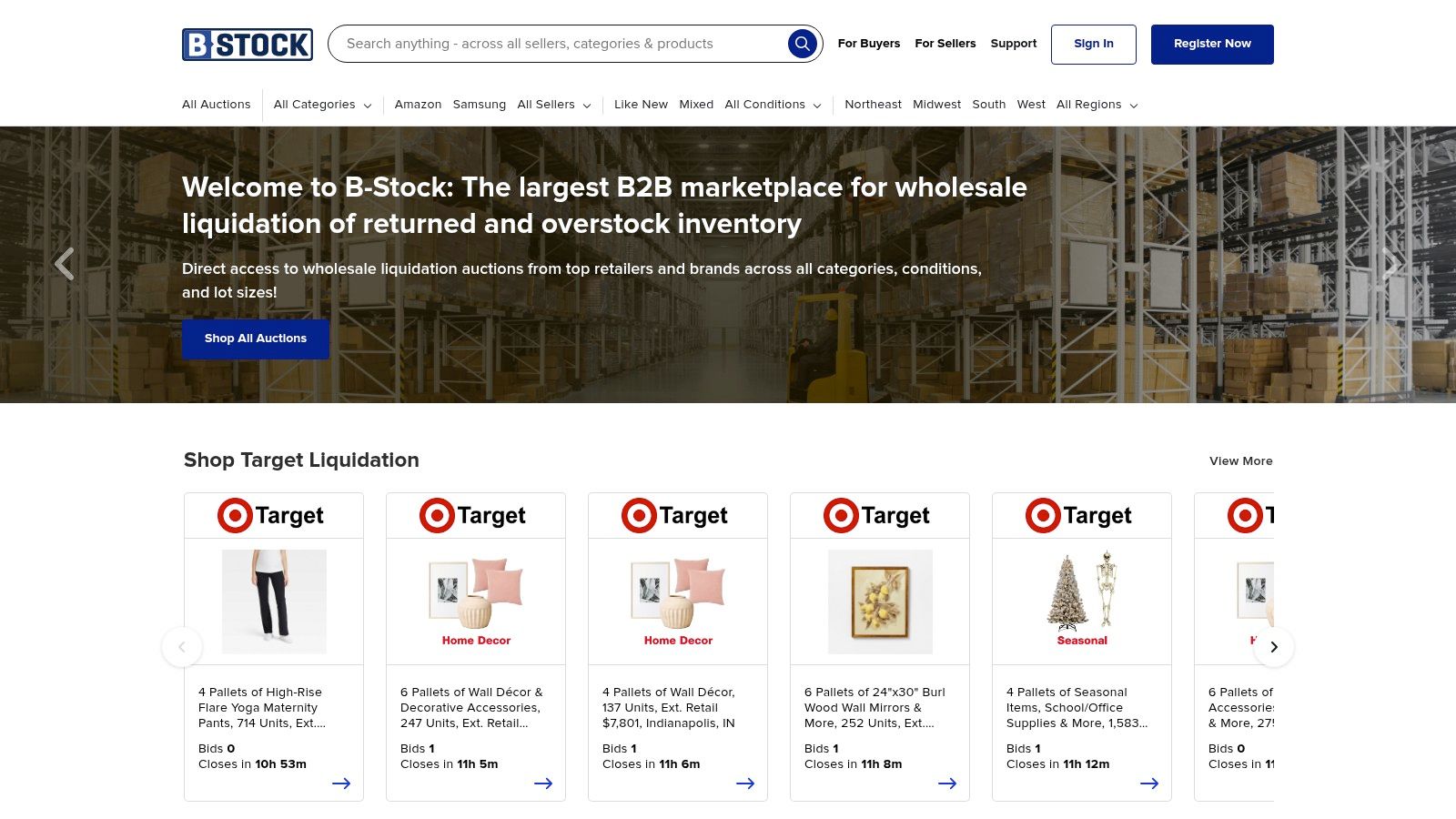
The platform’s key advantage is its direct-from-retailer supply chain. This significantly reduces the risk of the inventory being "cherry-picked" by middlemen before you get to it. You are often the first person outside the original retailer to sort through the goods, increasing your chances of finding some of the most profitable items to resell.
Sourcing and Strategy on B-Stock
Success on B-Stock requires a strategic approach. It's not about finding one golden item; it's about understanding the value of an entire lot.
- Read the Manifest: Many listings include a detailed manifest, which is an itemized list of everything in the pallet or truckload. This document is crucial for estimating the total potential resale value and calculating your profit margin before placing a bid.
- Filter and Search: Use the site’s powerful filters to narrow down listings by category (e.g., electronics, apparel, home goods), condition (e.g., new, used, salvage), and warehouse location to minimize freight costs.
- Calculate 'Landed Cost': Your "landed cost" is your final bid price plus shipping and any other fees. You must factor freight costs into your budget, as they can be substantial. Use B-Stock’s shipping estimator or get independent quotes to ensure the lot remains profitable after delivery.
- Start Small: If you're new, consider starting with smaller, single-pallet lots or "LTL" (Less Than Truckload) shipments to learn the process without a massive initial investment.
Pro Tip: Look for auctions ending at odd hours or on holidays. With fewer active bidders, you may be able to win a lot for a lower price. Also, pay close attention to the estimated retail value (MSRP) listed, but do your own research to determine the realistic current market value of the items.
Link to website: https://bstock.com
3. Liquidation.com
Liquidation.com is a veteran in the liquidation industry, offering an online auction marketplace for surplus, customer returns, and salvage merchandise. The platform sources inventory from major retailers and manufacturers, allowing resellers to bid on everything from single cases to full truckloads. Its long-standing presence provides a continuous stream of inventory across a wide range of categories, including electronics, clothing, housewares, and industrial equipment.
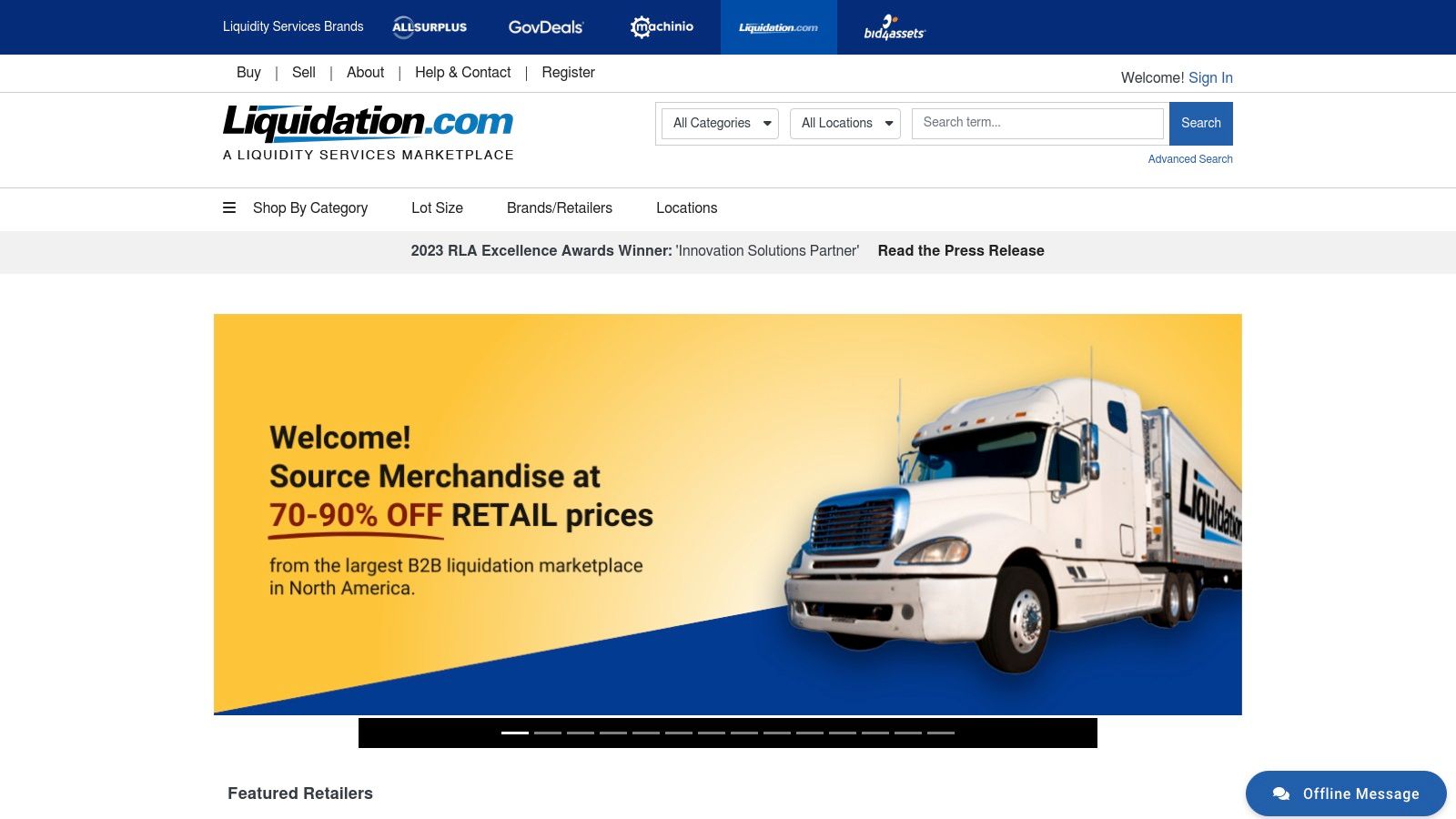
The key distinction for Liquidation.com is its transparent approach to fulfillment costs. Each auction listing features a built-in shipping calculator, enabling you to estimate your total "landed cost" before placing a bid. This feature is invaluable for new and experienced resellers alike, as it helps prevent unexpected freight charges from eroding your profit margins on what could otherwise be some of the most profitable items to resell.
Sourcing and Strategy on Liquidation.com
Success on Liquidation.com hinges on careful due diligence and a clear understanding of the all-in costs. Mastering the platform's tools is essential for building a profitable resale business.
- Analyze the Manifest: Just like other B2B platforms, the manifest is your guide. Scrutinize the item descriptions, quantities, and conditions to project your potential return on investment.
- Use the Shipping Estimator: Always use the shipping quote tool on the listing page. Enter your zip code to get an immediate estimate, which you must factor into your maximum bid price to ensure profitability.
- Explore Fulfillment Options: The platform offers multiple ways to receive your goods. You can use their integrated shipping, arrange for your own freight carrier, or, on eligible lots, schedule a pickup from the warehouse.
- Research Seller Ratings: Pay close attention to seller ratings and reviews. While inventory comes from major retailers, it is processed through various sellers on the platform, and quality can vary. Learn more about the best practices for flipping items for profit to protect your investment.
Pro Tip: Read the terms and conditions for each auction carefully, especially regarding claims and returns. If you choose to pick up a lot yourself, inspect the inventory thoroughly before leaving the facility, as your ability to file a dispute may be limited once you take possession.
Link to website: https://www.liquidation.com
4. 888 Lots
888 Lots is a B2B liquidation platform that offers resellers a more granular approach to sourcing inventory. Unlike traditional pallet-only wholesalers, 888 Lots allows you to purchase by the lot or even by the individual item, primarily dealing in brand-new, customer returns, and box-damaged goods. This flexibility makes it an excellent resource for sellers who want to test products without committing to massive quantities.
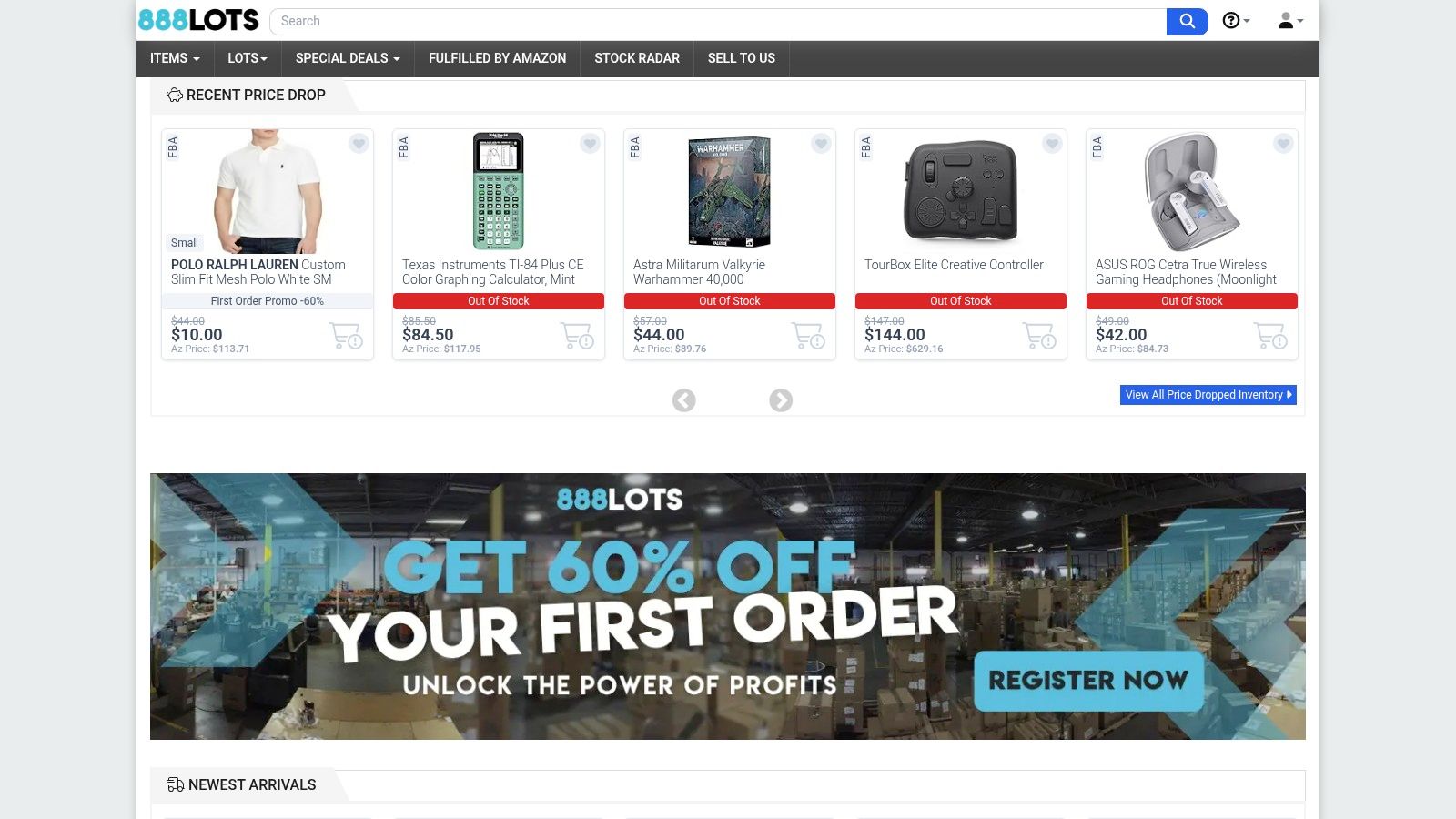
The platform’s standout feature is its highly detailed manifests. Each lot comes with crucial e-commerce data like UPCs, ASINs, estimated retail prices, and even Amazon sales rank and review information. This data-rich environment empowers sellers to make informed buying decisions, accurately forecast profits, and find some of the most profitable items to resell with greater confidence.
Sourcing and Strategy on 888 Lots
Success on 888 Lots hinges on leveraging its unique data and negotiation tools to protect your margins. It’s ideal for Amazon FBA sellers and those who thrive on arbitrage.
- Analyze the Manifest Data: Don't just look at the product list. Use the provided ASINs and UPCs to research current market prices on platforms like Amazon and eBay. The manifest data gives you a powerful head start on competitive analysis.
- Use the 'Negotiator' Tool: Most lots feature a "Negotiate" button. This tool lets you submit an offer below the asking price and provides a real-time profit estimate based on your proposed cost. Use this to secure a better deal, especially on larger lots.
- Filter for High-Demand Categories: Use the site's filters to zero in on profitable niches like electronics, toys, home goods, or beauty. Pay attention to "New Arrivals" and promotional emails, as the best inventory often sells out quickly.
- Start with Fixed-Price Items: If you're new to the platform, consider purchasing individual fixed-price items first. This allows you to test the product quality and fulfillment process with minimal risk before moving on to bidding on larger, more complex lots.
Pro Tip: You will typically need a resale certificate to create an account, so have your business documentation ready. Set up email alerts for your preferred categories to get notified immediately when new, high-potential inventory is listed.
Link to website: https://www.888lots.com
5. Direct Liquidation
Direct Liquidation is an online auction marketplace that offers resellers access to liquidation inventory from major North American retailers and manufacturers. Similar to other B2B platforms, it specializes in customer returns, overstock, and end-of-life products sold by the pallet or truckload. Its key differentiator is the availability of in-house refurbished inventory, which provides a unique opportunity to acquire electronics and other goods that are closer to "shelf-ready" condition.
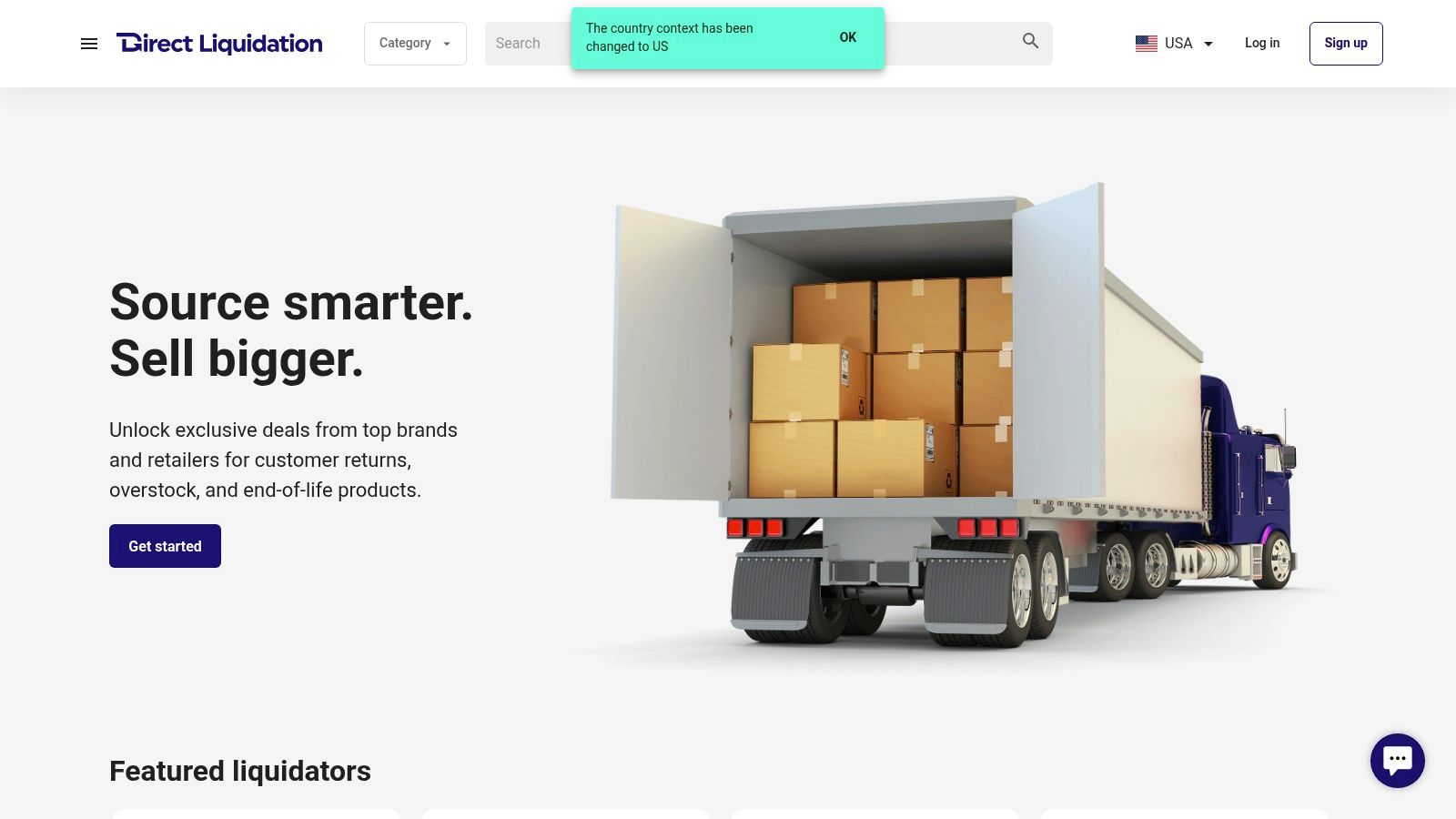
This focus on refurbishment can significantly reduce the prep work required by the reseller. While you can still purchase untested customer returns, having the option to bid on professionally tested and repaired items allows you to secure some of the most profitable items to resell with greater confidence in their functionality. The platform's transparent manifests and multiple warehouse locations make it a strong contender for serious resellers.
Sourcing and Strategy on Direct Liquidation
Success on Direct Liquidation hinges on careful analysis of manifests and logistics before you bid.
- Analyze the Manifest: Most listings provide downloadable manifests with granular detail, including UPCs, model numbers, condition codes, and retail prices. Scrutinize this document to understand the true composition and condition of the lot.
- Understand Condition Codes: Pay close attention to the condition listed for each item, whether it's "New," "Refurbished," "Used," or "Salvage." The value and your potential profit margin will vary dramatically between these categories.
- Calculate Landed Cost: Each listing includes a shipping calculator. Use this tool to determine your total "landed cost" (final bid price + shipping fees) before placing a bid. Freight costs can be high, so this step is non-negotiable for protecting your profits.
- Leverage Multiple Warehouses: Direct Liquidation ships from warehouses across North America. Filter auctions by the location closest to you to drastically reduce shipping expenses and delivery times.
Pro Tip: Look for auctions from specific retailers known for high-value returns in your niche. A pallet of home goods from one retailer might have a completely different average resale value than one from another, even if the manifest looks similar.
Link to website: https://www.directliquidation.com
6. Alibaba
Alibaba is the world’s largest business-to-business (B2B) sourcing platform, connecting resellers directly with manufacturers, primarily from Asia. Instead of flipping one-off items, this platform is for sourcing products in bulk at extremely low unit costs. It’s the go-to destination for resellers looking to create their own private-label brands or scale their inventory with consistent, high-margin products.
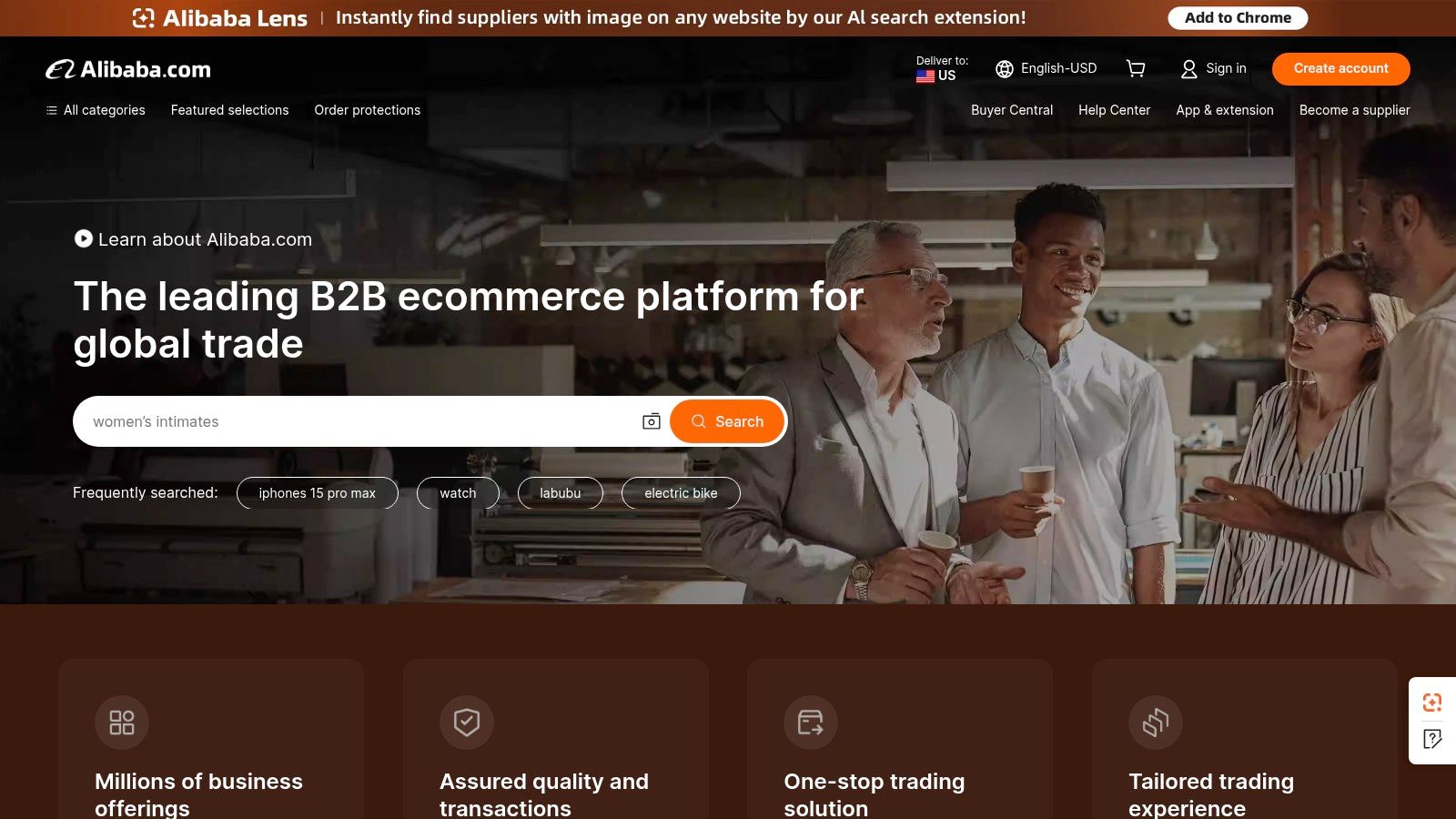
The platform's massive advantage lies in its direct-from-factory model, which unlocks unparalleled pricing and customization options. For those wondering how to start a resale business with a unique product line, Alibaba offers the tools to turn an idea into a physical product, providing some of the most profitable items to resell by allowing you to control the brand and supply. Its Trade Assurance program adds a layer of security by protecting payments until you confirm satisfactory delivery.
Sourcing and Strategy on Alibaba
Succeeding on Alibaba requires a different mindset than traditional thrifting; it's about manufacturing, logistics, and brand building.
- Filter for Verified Suppliers: Look for suppliers with "Verified" badges and a high number of "years as a Gold Supplier." These indicators suggest a more established and reliable manufacturer. Reading reviews and transaction histories is also crucial.
- Always Order Samples: Never commit to a large order without first ordering a sample to verify the product's quality, materials, and appearance. This small upfront cost can save you from a major loss on a bulk purchase.
- Negotiate and Clarify: Communicate clearly with suppliers about your product specifications, packaging, and branding. Don't be afraid to negotiate on price, especially for larger orders, but prioritize quality and reliability over the absolute lowest cost.
- Understand Total Landed Cost: The unit price is just the beginning. You must account for shipping (often sea freight for bulk orders), customs duties, and import taxes to calculate your true cost per item and ensure profitability.
Pro Tip: Use Alibaba's Request for Quotation (RFQ) feature. Instead of searching for suppliers, you can post your product requirements and have interested manufacturers bid on your order. This can save time and help you find competitive pricing from highly motivated suppliers.
Link to website: https://www.alibaba.com
7. Jungle Scout
Jungle Scout is less of a direct sourcing platform and more of a powerful intelligence tool for Amazon sellers. It's a comprehensive software suite designed to help you discover high-demand, low-competition products, making it an essential resource for identifying some of the most profitable items to resell. By analyzing millions of data points, it takes the guesswork out of product research, whether you're sourcing for online arbitrage, wholesale, or creating your own private label brand.
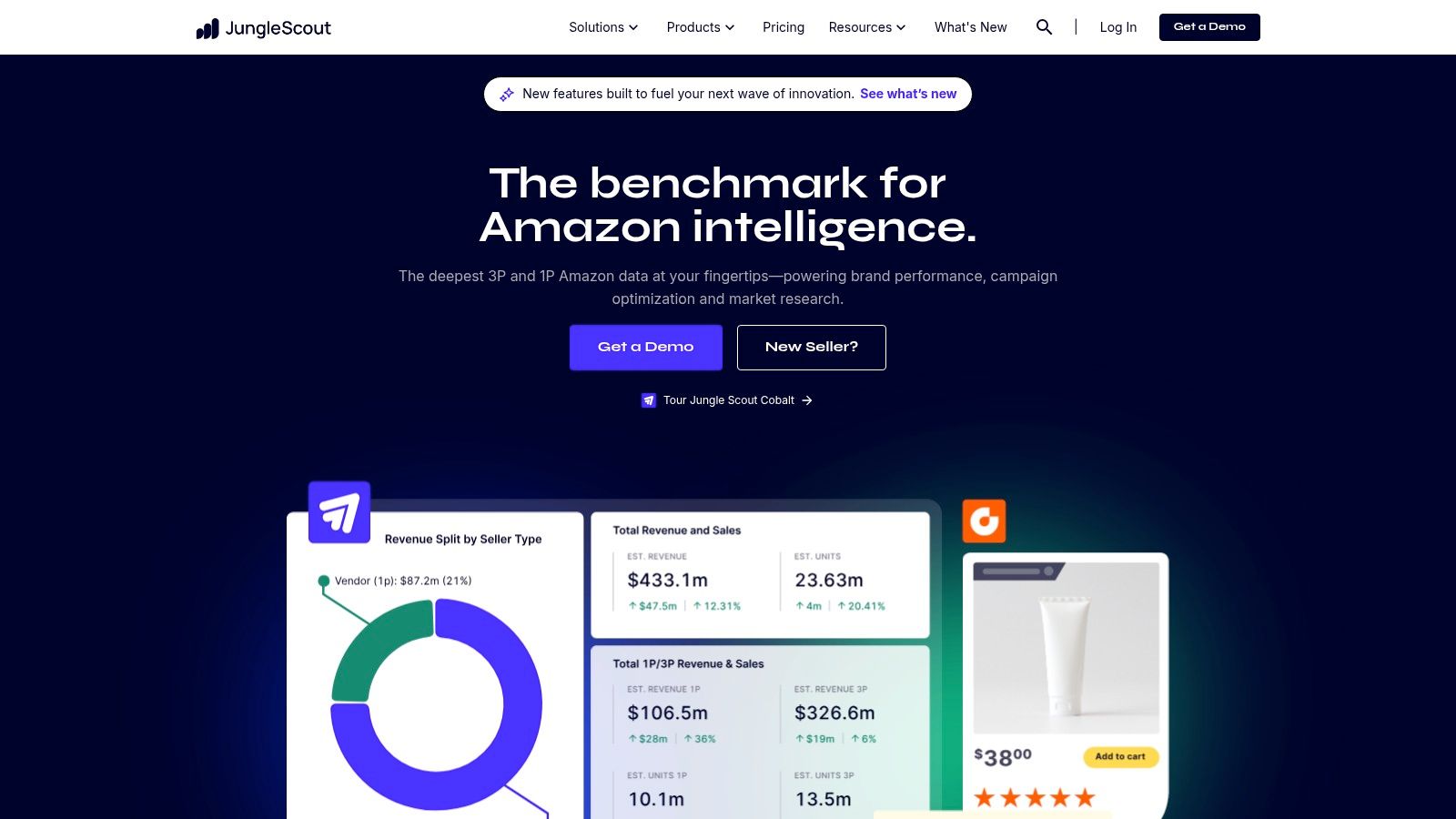
The platform’s key advantage is its data-driven approach. Instead of relying on intuition, you can validate product ideas with concrete numbers like estimated monthly sales, revenue, and historical price trends. This allows you to invest in inventory with a much higher degree of confidence, avoiding saturated markets and focusing on profitable niches. It is considered one of the best apps for resellers focused on the Amazon ecosystem.
Sourcing and Strategy on Jungle Scout
Success with Jungle Scout means leveraging its data to make smarter sourcing decisions. It’s about finding opportunities before the competition does.
- Use the Product Database: This feature lets you filter Amazon's entire catalog by category, price, monthly sales, and more. Set your criteria to find products that match your specific business model, such as items with high sales but few seller reviews.
- Leverage the Browser Extension: Install the Chrome or Firefox extension to analyze product data directly on Amazon search or product pages. In one click, you can see a product's sales history, price fluctuations, and an overall "Opportunity Score" to quickly validate its potential.
- Find Keywords with Keyword Scout: Uncover what customers are actually searching for. High-volume keywords with low competition can signal an underserved market, pointing you toward profitable product categories you may not have considered.
- Analyze the Competition: Use the Rank Tracker and Listing Analyzer tools to see how well competing products are performing. This helps you understand what it will take to compete and if a particular niche is worth entering.
Pro Tip: Use the Opportunity Finder tool to spot emerging trends. Look for keywords with high search volume growth and a low number of established sellers. This is a powerful way to get in on a profitable product before the market becomes saturated.
Link to website: https://www.junglescout.com
Top 7 Resale Sources: Profitability Comparison
| Product | 🔄 Implementation complexity | ⚡ Resource requirements | 📊 Expected outcomes | 💡 Ideal use cases | ⭐ Key advantages |
|---|---|---|---|---|---|
| Curio | Low — mobile app, minimal setup | Low — smartphone; freemium/subscription for heavy use | Quick, AI IDs; provenance notes; pricing guidance (not a substitute for in-person auth) | Thrifting, estate sorting, small resellers, quick appraisals | Instant AI ID + historical context; collection manager; strong user trust |
| B-Stock | Medium — account, bidding workflow | Moderate — capital for lots, freight coordination, storage | Access to retailer pallets/truckloads; variable margins depending on competition | Resellers sourcing large lots from retailers, liquidation buyers | Direct-from-retailer supply; frequent listings; itemized manifests |
| Liquidation.com | Medium — auction participation, manifest review | Moderate — shipping quotes, fulfillment planning, due diligence | Continuous inventory flow; variable condition; predictable shipping estimates | Buyers who plan logistics and closely evaluate landed cost | Shipping-quote tool; multiple fulfillment options; steady inventory |
| 888 Lots | Medium-Low — account required (resale cert often) | Low–Moderate — can buy per-item or lots; negotiate prices | Granular arbitrage opportunities; faster margin validation via manifests | Arbitrage and wholesale sellers needing item-level data | Detailed manifests (ASIN/UPC/MSRP); price negotiator; per-item purchases |
| Direct Liquidation | Medium — manifests, truckload programs | Moderate–High — freight, landed-cost analysis, variable conditions | Recurring supply lanes; mix of refurbished and returns; manifest visibility | Resellers seeking recurring routes and refurbished-ready items | Downloadable manifests; in-house refurbishment; multiple warehouses |
| Alibaba | High — supplier vetting, MOQs, customs processes | High — MOQ, lead time, sea freight, customs, quality control | Scalable private-label or wholesale sourcing with low unit costs at volume | Private-label brands, bulk manufacturing, large-scale sourcing | Very low unit costs at scale; customization; Trade Assurance protections |
| Jungle Scout | Medium — learning curve; subscription + browser extension | Low–Moderate — subscription cost, time for research | Better product selection, demand validation, listing & inventory optimization | Amazon sellers (OA/wholesale/private-label) validating opportunities | Consolidated market data, research tools, rank & inventory management |
From Find to Fortune: Turning Knowledge into Profit
You've explored the tools and strategies to uncover high-margin inventory, from sourcing bulk pallets on Liquidation.com to identifying unique collectibles with Curio. The journey from finding an item to making a sale is where knowledge transforms into profit. The most profitable items to resell are rarely discovered by luck alone; they are found by dedicated resellers who invest time in learning their niche and understanding market demand.
The common thread connecting every successful flip is informed decision-making. Whether you're navigating the vast B2B marketplace of Alibaba or bidding on B-Stock pallets, the fundamental principle remains the same: buy low by recognizing hidden value and sell high by proving that value to a new owner. This requires more than just a good eye; it demands research, strategy, and the right digital tools.
Key Takeaways for Your Reselling Journey
Your next steps are about turning these insights into a repeatable process. The difference between a hobby and a business is consistency.
- Specialize to Capitalize: Don't try to be an expert in everything. Choose a category that genuinely interests you, whether it's vintage electronics, designer apparel from liquidation lots, or niche collectibles. Passion fuels persistence.
- Leverage Sourcing Platforms: Use platforms like Direct Liquidation and 888 Lots to acquire inventory at a deep discount. Remember to factor in shipping costs and the potential for a small percentage of unsellable goods when calculating your potential profit.
- Validate Before You List: Before you set a price, use tools to research comparable sales (comps). Understanding an item's current market value is non-negotiable for maximizing your return. This step prevents you from underpricing a gem or overpricing an item that won't move.
Choosing Your Platform and Perfecting Your Listings
Once you've identified potential profitable items, understanding the best channels to sell them is crucial. Different products perform better on different marketplaces. For example, consumer electronics often require a platform that can handle detailed specifications and attract tech-savvy buyers. If you're sourcing refurbished electronics, knowing where to sell laptops for the best price can make a significant difference in your final profit margin.
No matter where you sell, your listing quality is paramount. High-quality photos, detailed and honest descriptions, and strategic keyword usage are what bridge the gap between you and your ideal customer. Treat every listing as your digital storefront.
The path to a successful reselling business is built one smart find at a time. The tools and items discussed in this guide provide a blueprint, but your unique expertise and effort are the true keys to unlocking a sustainable income. Start small, learn continuously, and turn your next find into your next fortune.
Ready to stop guessing and start knowing what your finds are worth? Curio uses AI-powered image recognition to identify art, antiques, and collectibles in seconds, giving you real-time pricing data and historical sales information right from your phone. Download Curio today and turn your treasure hunt into a data-driven business.
